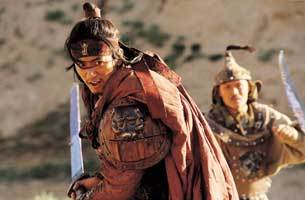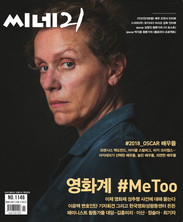언제부터 한국영화가 이렇게 길어졌을까? 예전에는 일본영화가 과도하게 긴 러닝타임으로 유명했는데, 요즘에는 이런 묘사가 한국에도 잘 들어맞는 것 같다. 저예산 독립영화는 제쳐두고 보면, “짧고 산뜻한”이란 개념은 한국 영화산업에서 사라진 듯하다.
수치를 보면 그 증거가 드러난다. 2001년 극장에서 개봉한 65편의 한국영화 중 단 3편만이 2시간을 넘어섰다. <킬러들의 수다>는 120분, <엽기적인 그녀>는 123분, <무사>는 157분이었다. 지난해에는 상대적으로 2시간을 넘어선 영화가 13편 있었고, 2006년 1월과 2월에는 5편 이상 있었다. 요즘은 100분 이하의 한국영화는 드물 정도다.
긴 러닝타임이 본질적으로 나쁜 것은 아니다. <7인의 사무라이> 같은 훌륭한 영화는 보는 동안 시간 가는 것을 거의 눈치채지 못하게 된다. 그러나 최근 친구 중 한명이 말한 것처럼 관객의 관심을 두 시간 이상 유지해나가는 것은 대단한 감독의 재능을 요구한다. 이제 막 영화학교를 졸업한 감독은 마음을 끄는 100분 정도의 흥미로운 영화를 만들 재주는 있을지 모르지만, 130분의 좋은 영화를 만들기에는 아직 경험이 부족할 것이다. 그럼에도 제작자들은 요즘 짧은 영화보다는 긴 것을 만들도록 격려하는 것 같다.
사실 한국에서만 긴 러닝타임이 관행이 된 것은 아니다. <뉴욕타임스>의 비평가 데이브 케르는 고도기술의 디지털 편집 시스템 때문에 영화 평균 러닝타임이 길어졌다고 최근 주장했다. 과거에는 편집을 하려면 실제로 필름을 자르고 조각을 잇는 작업을 해야 했던 반면, 요즘에는 디지털 방식으로 한 장면에 숏을 추가하는 것이 너무나 쉽게 되기 때문에 영화가 자연스럽게 길어졌다는 것이다.
그러나 더 큰 문제는 편집 단계보다는 시나리오 작업 단계에 있는 듯하다. 다음의 작은 일화는 더 큰 문제를 보여주고 있다. 필자는 영화에서 인물이 아무 말도 하지 않는 순간에 일련의 점(“…”)을 나열하는 한국의 시나리오 관행이 늘 궁금했었다. 이런 방식은 서구 시나리오에서는 사용되지 않는 것인데, 그렇게 하는 이유를 시나리오 작가에게 물어봤더니 그는 “확실히 모르겠지만, 아마도 사람들이 시나리오를 더 길어 보이게 하려고 그러는 것 같아요”라고 대답했다.
이것이 실제 이유인지 여부와는 상관없이 그 대답 자체가 본인을 놀라게 했다. 왜냐하면 젊은 시나리오 작가들이 시나리오를 더 길어 보이게 해야 한다는 압력 같은 것을 느낀다는 것을 뜻했기 때문이다. 그리고 이것이 사실이라면 비난은 제작자쪽으로 가야 한다. 좋은 프로듀서의 능력 중 하나는 시나리오를 보고 영화 길이를 판단하고, 편집 단계에서보단 시나리오 단계에서 작품을 줄이는 것이다. 너무 긴 영화는 시나리오 작가나 프로듀서의 자신감 부족을 나타내는 것 같다. 자꾸 장면과 반전을 추가하는 것이 더 완성도 있고 재미있는 영화를 만들 것도 같겠지만, 현실적으로 그 반대가 맞다. 관객에겐 오히려 더 짧은 영화가 더 강렬하고 신나는 경험을 제공한다. 불필요한 장면과 인물들을 들어내면 영화가 더 강해진다.
이전의 한국영화는 야위고 굶주렸었는데, 바로 그게 한국영화의 호소력 중 큰 부분을 차지했었다. 그러나 성공은 종종 자기 만족과 나태로 가게 한다. 관객 증가와 40% 이상의 시장점유율이 지속된 5년, 한국영화는 비대해지기 시작했는가?
Since when did Korean movies get so long? It used to be that Japanese films were famous for their excessively long running times, but these days the description seems just as well suited to Korea. Apart from low-budget independent films, the concept of "short and sweet" seems to have vanished from the industry.
A look at the numbers bears this out. In 2001, among the 65 Korean films released in theaters, only three topped out at over two hours: Guns & Talks (120 min), My Sassy Girl (123 min), and Musa (157 min). Last year, in contrast, there were thirteen, and in January and February of 2006 there were five more. These days, it's become rare to find any Korean film that clocks in at under 100 minutes.
There's nothing inherently wrong with long running times. Watching a great film like Seven Samurai, you hardly notice the time pass. Yet as a friend of mine recently commented, it takes a great deal of directorial talent to keep an audience's attention over two hours. A director just out of film school may have the skill to make an engaging, interesting 100-minute movie, but is probably not experienced enough to make a good 130-minute movie. Nonetheless, producers these days seem to be encouraging longer films, rather than shorter ones.
Actually, it's not only Korea where long running times are becoming the norm. Critic Dave Kehr of the New York Times recently postulated that high-tech digital editing systems were responsible for an increase in the average length of films. Whereas in the past, editing involved actually cutting up and piecing together strips of film, these days it's become so easy to add shots to a scene digitally that films have naturally grown longer.
Yet the bigger problem seems to exist at the screenwriting, rather than the editing stage. The following small anecdote may illustrate a larger problem. I've always been curious about the practice in Korean screenplays of writing a series of dots (". . .") at a moment in the film when a character doesn't say anything. This is not used in Western screenplays, and when I asked one screenwriter the reason for this, he replied, "I'm not sure, but it's probably because people want to make their screenplays look longer."
Regardless of whether or not this is the actual reason, the answer surprised me, because it suggests that young screenwriters feel some sort of pressure to make their screenplays long. And if this is true, then the blame must be placed at the feet of producers. Part of the skill of being a good producer is to be able to judge from a screenplay how long a film will be, and then to shorten the work at the script stage, rather than the editing stage. Films that are too long seem to indicate a lack of confidence on the part of the screenwriter or the producer. It may seem like adding more and more scenes and twists will make for a more complete, interesting movie, but in reality the opposite is true. A shorter film provides a more intense, exciting experience for viewers. By taking out unneccessary scenes and characters, the film becomes stronger.
Korean films used to be lean and hungry, and that was a big part of their appeal. But success often leads to complacency and sloth. After five years of rising admissions and a 40%+ market share, is Korean cinema starting to get a bit fat?


